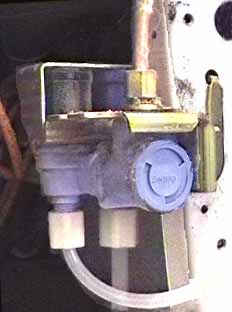As a result the valve leaks water into the ice maker causing it to overflow.
Ice maker water inlet valve leaking.
If the water pressure is too low the valve may not close fully when the power is shut off.
Use a bucket to catch all of the water from inside the inlet valve.
Repair any leak or replace the leaking part.
If the ice maker leaks water first check for leaks in the house water supply line connected to the water inlet valve the drain line and the drain pump.
It is usually on the rear of the fridge near the bottom.
If a dish towel or other item manages to lodge itself underneath the floor drain water won t drain properly and will overflow giving the appearance a leak has sprung underneath your ice machine.
If you are testing the inlet valve you must first disconnect the power so it s safe to work on your freezer.
The water line from the water valve to the ice maker can freeze not letting water into the ice maker.
The valve requires a minimum of 20psi to work properly.
Replace the reservoir if it leaks.
You will need to remove the rear panel to access it.
The water inlet valve supplies water to the refrigerator ice and water dispenser.
Pull the refrigerator away from the wall and turn off the water supplying the ice maker.
Turn the water off at the source and then disconnect the supply line.
Where to find the water inlet valve.
The water valve supplying the icemaker is a key component of the icemaking system and it should be the first thing you check if the icemaker s performance is erratic or if the icemaker stops.
To check the water valve unplug the refrigerator and shut off the water supply to the refrigerator.
Unplug your refrigerator disconnect the water supply and locate your water inlet valve.
Ice machines typically require an air gap which is a space between your ice machine drain line and the floor drain.
Inspect the valve inlet supply connections for leaks and tighten or replace the connectors.
Next unplug the ice maker and check the water reservoir for a crack or hole.
Although less of a leak and more of a drainage issue the symptoms are similar which leads customers to believe their ice maker is leaking.
Once it s determined that neither of these are the problem you should check the water valve.

